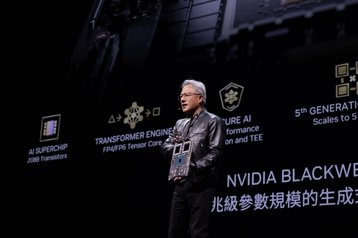Nvidia has fixed the issue that caused shipments of its upcoming Blackwell GPUs to be delayed.
Speaking on the company’s earnings call after publishing its Q3 2024 financial results, CFO Colette Kress said that Nvidia had addressed the GPUs’ yield issues and was planning to ramp up production in the final quarter of the year.
She added that Nvidia was expecting to ship “several billion dollars in Blackwell revenue during Q4 2024.
“We executed a change to the Blackwell GPU mass to improve production yields. Blackwell production ramp is scheduled to begin in the fourth quarter and continue into fiscal year 2026,” Kress told analysts on the call, adding that Hopper shipments are expected to increase in the second half of fiscal 2025, and that supply and availability of Hopper GPUs has improved.
“Demand for Blackwell platforms is well above supply, and we expect this to continue into next year,” Kress said.
Reports that Nvidia was delaying the rollout of its Blackwell GPUs by approximately three months due to “unexpected design flaws” first surfaced in early August.
On the same earnings call, addressing a previous statement from Nvidia that said a change to the Blackwell GPU mask had been made in order to improve production yield, CEO Jensen Huang confirmed that the change was now complete, but said no functional alterations to Blackwell had been necessary.
No further information about the fix deployed by Nvidia has been disclosed.
“We're sampling functional samples of Blackwell – Grace Blackwell in a variety of system configurations as we speak,” he said, adding “The functionality of Blackwell is as it is, and we expect to start production in Q4.”
Nvidia posted revenues of $30 billion in its latest earnings report, with the company’s data center division bringing in $26.3bn, an increase of 154 percent from the same period last year.
“Nvidia achieved record revenues as global data centers are in full throttle to modernize the entire computing stack with accelerated computing and generative AI,” Huang said.




